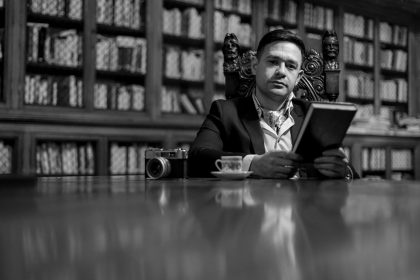Alexandre Kojève: 3 Profound Ideas That Shaped Modern Thought
alexandre-kojeve Alexandre Kojève: 3 Profound Ideas That Shaped Modern Thought Alexandre Kojève:…
Alexandre Kojève’s Philosophy: 5 Key Ideas That Shaped Modern Thought
Alexandre Kojève’s Philosophy: 5 Key Ideas That Shaped Modern Thought
Unpacking Alexandre Kojève’s Philosophy: A Legacy of Profound Influence
Have you ever wondered about the intellectual lineage behind some of the most impactful ideas of the 20th century? Many profound concepts that shaped political thought and beyond can be traced back to the insightful mind of Alexandre Kojève. His unique interpretations, particularly of Hegelian thought, provided a foundational framework for numerous influential thinkers, including figures like Allan Bloom and Francis Fukuyama. Understanding Alexandre Kojève’s philosophy is crucial for anyone seeking to grasp the undercurrents of modern intellectual history.
Who Was Alexandre Kojève?
Born in Russia as Aleksandr Vladimirovich Kozhevnikov, Alexandre Kojève (1902–1968) was a Russian-French philosopher and statesman whose lectures on Hegel in Paris during the 1930s became legendary. These seminars attracted an astonishing array of intellectuals who would go on to define post-war European thought. Far from a mere academic, Kojève’s life was a fascinating blend of profound philosophical inquiry and practical engagement with the world.
Early Life and Intellectual Roots
Kojève’s early life was marked by the tumultuous events of the Russian Revolution, which eventually led him to emigrate. He studied in Germany, where he engaged deeply with phenomenology and existentialism, particularly the works of Heidegger. This rigorous intellectual background prepared him for his groundbreaking re-evaluation of Georg Wilhelm Friedrich Hegel.
The Hegelian Seminars: A Crucible of Ideas
From 1933 to 1939, Kojève delivered his famous lectures on Hegel’s *Phenomenology of Spirit* at the École des Hautes Études in Paris. These weren’t just lectures; they were intellectual events that drew the likes of Raymond Aron, Georges Bataille, Jacques Lacan, Maurice Merleau-Ponty, and even future French President Georges Pompidou. His charismatic and definitive interpretations profoundly shaped a generation, demonstrating the dynamic power of Alexandre Kojève’s philosophy.
Key Concepts in Alexandre Kojève’s Philosophy
Kojève wasn’t simply translating Hegel; he was reinterpreting him for a modern audience grappling with totalitarianism, war, and the search for meaning. His most enduring contributions often stem from this fresh perspective.
The End of History
Perhaps Kojève’s most famous concept, “The End of History,” posits that humanity’s ideological evolution has reached its conclusion. For Kojève, this wasn’t the cessation of events, but rather the point where the fundamental questions of political and social organization have been resolved. He argued that the French Revolution and Napoleon’s empire marked the beginning of this ‘end,’ culminating in a universal homogeneous state where all individuals are recognized. This idea later gained significant traction through Francis Fukuyama’s influential work.
Master-Slave Dialectic Reimagined
Kojève’s reading of Hegel’s master-slave dialectic is central to his thought. He emphasized the transformative power of the slave’s labor and fear of death. The slave, through transforming nature and risking their life, ultimately achieves self-consciousness and freedom, while the master remains static. This interpretation highlights the dignity of human work and the path to self-realization through struggle and recognition.
Desire and Recognition
For Kojève, human beings are fundamentally driven by desire, not merely for material objects, but for the recognition of their own desire by another. This “desire of desire” is what elevates humans above animals and fuels the historical process. The struggle for mutual recognition is the engine of history, moving humanity towards a state where universal recognition is achieved.
The Enduring Influence of Kojève’s Philosophy
The reach of Kojève’s ideas extends far beyond the lecture halls of 1930s Paris. His interpretations continue to resonate in various fields, proving the timeless relevance of Alexandre Kojève’s philosophy.
Impact on Political Thought
Kojève’s influence on political philosophy is undeniable. His “End of History” concept directly inspired Francis Fukuyama’s seminal essay and book, which argued for liberal democracy as the final form of human government. Allan Bloom, another prominent political philosopher, was also deeply affected by Kojève’s thought, particularly his insights into classical philosophy and the nature of modernity. Kojève provided a lens through which to understand the trajectory of Western political development.
Beyond Politics: Art, Culture, and Existentialism
His impact wasn’t limited to politics. Thinkers across disciplines found inspiration in his work. Jacques Lacan, the renowned psychoanalyst, incorporated Kojève’s ideas on desire and recognition into his theories of the ego and the formation of subjectivity. His emphasis on the human struggle for meaning and recognition also deeply resonated with existentialist movements, offering a framework for understanding the human condition in a post-religious world.
Notable Thinkers Influenced by Kojève:
- Allan Bloom: His mentor, who transmitted Kojève’s ideas to a new generation of American scholars.
- Francis Fukuyama: Popularized the “End of History” concept in his influential works.
- Jacques Lacan: Incorporated Kojève’s theories of desire and recognition into psychoanalysis.
- Raymond Aron: A key participant in the Hegelian seminars who became a prominent political commentator.
- Georges Bataille: Engaged with Kojève’s ideas on sovereignty and the limits of reason.
Exploring Kojève’s Texts: Where to Begin
For those eager to delve deeper into the primary sources, Kojève’s writings offer a challenging yet rewarding journey into the heart of modern philosophy. Engaging directly with his work provides the most comprehensive understanding of his unique contributions.
Essential Readings for Beginners
- Introduction to the Reading of Hegel: Lectures on the Phenomenology of Spirit: This is the definitive collection of his famous seminars and an absolute must-read for grasping his core interpretations.
- Outline of a Phenomenology of Right: While less famous, this work offers insights into his later political philosophy and his understanding of the state.
Further Scholarly Resources
To further explore the nuances and extensive commentary surrounding Alexandre Kojève’s philosophy, authoritative academic resources are invaluable. The Stanford Encyclopedia of Philosophy provides an excellent overview and bibliography. Additionally, various university presses offer critical analyses of his work, such as those found through Princeton University Press, which publishes key translations and scholarly interpretations.
Why Alexandre Kojève’s Philosophy Matters Today
In an era characterized by ideological flux, global challenges, and a constant search for identity, Kojève’s insights remain remarkably pertinent. His exploration of recognition, desire, and the dialectical process offers powerful tools for analyzing contemporary social and political dynamics. Whether one agrees with his conclusions or not, his framework provides a compelling lens through which to understand the trajectory of human history and our place within it.
Conclusion: A Continuing Dialogue
Alexandre Kojève was more than just a philosopher; he was an intellectual catalyst whose ideas reshaped how we understand history, human desire, and the very nature of political existence. His profound interpretations continue to spark debate and inspire new generations of thinkers. By engaging with Alexandre Kojève’s philosophy, we gain a deeper appreciation for the complex intellectual currents that define our modern world. What aspects of Kojève’s thought resonate most with you in today’s society?
© 2025 thebossmind.com
Explore Alexandre Kojève’s philosophy and his enduring influence on modern thought, from the “End of History” to the master-slave dialectic. Discover how this Russian-French philosopher shaped thinkers like Fukuyama and Bloom.
Alexandre Kojève's Philosophy: 5 Key Ideas That Shaped Modern Thought Featured image…
Alexandre Kojève Philosophy: Unpacking His 3 Core Ideas
alexandre-kojeve-philosophy Alexandre Kojève Philosophy: Unpacking His 3 Core Ideas Alexandre Kojève Philosophy:…
Alexandre Kojève: Unlocking 3 Key Ideas of the French Philosopher
alexandre-kojeve Alexandre Kojève: Unlocking 3 Key Ideas of the French Philosopher Alexandre…
Alexandre Kojève’s Philosophy: 7 Key Insights Shaping Modern Thought
Alexandre Kojève’s Philosophy: 7 Key Insights Shaping Modern Thought
Alexandre Kojève’s Philosophy: 7 Key Insights Shaping Modern Thought
Have you ever wondered about the profound intellectual currents that quietly shape our understanding of history, politics, and even human nature? Deep within the annals of 20th-century thought lies the remarkable and often enigmatic **Alexandre Kojève’s philosophy**. This Russian-born French philosopher, despite publishing relatively little in his lifetime, cast an immense shadow over some of the most influential thinkers of his era and beyond. His reinterpretation of Hegelian thought provided a fertile ground for ideas that would redefine political science and contemporary philosophy.
This article delves into the core tenets of Kojève’s work, exploring how his unique perspective on Hegel’s “Phenomenology of Spirit” forged concepts that continue to resonate. From the master-slave dialectic to the controversial “End of History,” we’ll uncover the seven pivotal insights that make **Alexandre Kojève’s philosophy** an indispensable key to unlocking modern intellectual discourse.
Unpacking Alexandre Kojève’s Enduring Influence
Kojève’s impact is often traced through his illustrious students and interlocutors, rather than through his own extensive publications. His legendary seminars in Paris during the 1930s drew a who’s who of French intellectual life, including figures like Raymond Aron, Jacques Lacan, Maurice Merleau-Ponty, and Georges Bataille. These discussions, centered on Hegel, became a crucible for ideas that would later define French existentialism, structuralism, and even post-structuralism.
His teachings offered a radical re-reading of Hegel, emphasizing themes of desire, recognition, and the historical struggle for human fulfillment. This fresh perspective provided a powerful lens through which to analyze the tumultuous political landscapes of the 20th century and anticipate the challenges of the future. Understanding Kojève is, in many ways, understanding the intellectual bedrock of much modern European and American thought.
Who Was Alexandre Kojève? A Brief Intellectual Biography
Early Life and Hegelian Studies
Born Aleksandr Vladimirovich Kozhevnikov in Moscow in 1902, Kojève hailed from a prominent and wealthy family. His cousin was the artist Wassily Kandinsky. Following the Russian Revolution, he left for Germany, where he studied philosophy, mathematics, and Oriental languages. It was during this period that he immersed himself deeply in the works of G.W.F. Hegel, a fascination that would define his intellectual career.
He later settled in France, becoming a naturalized citizen. Despite his profound philosophical contributions, Kojève spent the latter part of his career working as a high-ranking civil servant in the French Ministry of Economic Affairs, playing a significant role in the formation of the European Economic Community. This dual life—philosopher and bureaucrat—speaks volumes about his practical engagement with the “End of History” he theorized.
His Paris Lectures and Their Legendary Impact
From 1933 to 1939, Kojève delivered a series of lectures on Hegel’s “Phenomenology of Spirit” at the École des Hautes Études. These seminars were not just academic exercises; they were transformative intellectual events. Kojève presented Hegel not as a dry idealist, but as a philosopher of action, desire, and historical struggle. He argued that human beings are fundamentally driven by a desire for recognition, a struggle that plays out in the dialectic of master and slave, ultimately propelling history forward.
The notes from these lectures, compiled and published posthumously as “Introduction to the Reading of Hegel,” became a foundational text for understanding **Alexandre Kojève’s philosophy** and its subsequent influence. It was through these lectures that his interpretations of Hegel became widely disseminated and profoundly impacted a generation.
Core Tenets of Alexandre Kojève’s Philosophy
At the heart of Kojève’s work lie several powerful and interconnected ideas. These insights provide a coherent framework for understanding human existence, history, and political development.
1. The Hegelian Master-Slave Dialectic Reimagined
Kojève offered a radical, anthropological reading of Hegel’s famous master-slave dialectic. For him, this was not merely a historical or sociological phenomenon but the very origin of human self-consciousness. The slave, by risking their life in the service of the master, and through their labor, transforms nature and thereby transforms themselves. This process grants the slave a self-awareness that the master, living in idle consumption, cannot achieve.
This struggle for recognition, where one’s humanity is affirmed by another, is central to Kojève. It’s a battle that drives individuals and entire societies, shaping their institutions and values. This dynamic is a critical lens through which to view the development of human history.
2. The “End of History” Concept Explained
Perhaps Kojève’s most famous and controversial idea is the “End of History.” He argued that history, understood as the process of human transformation through struggle and desire, culminates when humanity achieves a state of universal and reciprocal recognition. In this “universal homogenous state,” all individuals are recognized as free and equal, and the fundamental struggles that drive historical change cease.
This isn’t an end to events, but an end to history in its Hegelian sense – the dialectical progression towards full self-consciousness. While often misunderstood as a utopian vision, Kojève himself recognized its potential for boredom or the rise of “last men” devoid of grand desires. His insights here are crucial for understanding debates about post-Cold War politics and globalization.
3. Human Desire and Action: The Anthropogenetic Role of Negativity
For Kojève, human desire is not simply a biological craving. Instead, it is a desire for something that does not exist, a desire for recognition, a desire to be more than what one currently is. This “negativity” is the engine of human action and the source of history. Humans negate their natural givenness through work and struggle, creating culture, society, and ultimately, themselves.
This idea fundamentally separates humans from animals. Animals merely satisfy their needs, but humans transcend them through desire and the willingness to risk their lives for non-biological ends, particularly for recognition. This anthropological perspective is a cornerstone of **Alexandre Kojève’s philosophy**.
Kojève’s Influence on Contemporary Political Philosophy
The echoes of Kojève’s thought reverberate powerfully in modern political discourse, most notably through the work of two prominent American thinkers.
4. Shaping Allan Bloom and American Conservatism
Allan Bloom, a student of Leo Strauss, was deeply influenced by Kojève’s seminars. Bloom’s critique of modern American society, particularly his concerns about moral relativism and the decline of liberal education, can be traced back to a Kojèvian awareness of the “End of History” and its potential for a diminished human experience. Bloom saw the homogenization of modern democratic societies as potentially leading to a flattening of human spirit and aspiration, a fear that Kojève himself harbored regarding the “last man.”
5. Fukuyama’s “End of History” Thesis: A Direct Line from Kojève
Perhaps the most direct and widely recognized extension of **Alexandre Kojève’s philosophy** is Francis Fukuyama’s “End of History and the Last Man.” Fukuyama famously argued that the fall of communism and the global triumph of liberal democracy signaled the culmination of history, echoing Kojève’s concept of the universal homogenous state. He posited that liberal democracy, with its universal recognition of individual rights, satisfied the human desire for recognition (thymos), thus ending the fundamental ideological struggles that drive history.
While Fukuyama’s interpretation generated immense debate, it undeniably brought Kojève’s ideas into mainstream political discussion, solidifying his relevance in post-Cold War analyses. For a deeper understanding of Fukuyama’s thesis, consider exploring resources like Encyclopaedia Britannica’s overview of “The End of History and the Last Man”.
Beyond Politics: Kojève’s Broader Philosophical Footprint
Kojève’s influence was not confined to political philosophy. His insights permeated various other intellectual movements.
6. Impact on French Existentialism and Post-Structuralism
Kojève’s emphasis on desire, struggle, and the human creation of meaning profoundly impacted French existentialists like Jean-Paul Sartre and Simone de Beauvoir. His focus on human freedom, the negation of the given, and the pursuit of recognition resonated deeply with their concerns about individual responsibility and the construction of self in a seemingly meaningless world. Later, structuralist and post-structuralist thinkers also grappled with Kojève’s ideas, particularly his analysis of language, subjectivity, and the dialectical process.
7. Relevance to Modern Geopolitics and Identity
Even today, **Alexandre Kojève’s philosophy** offers valuable tools for analyzing global dynamics. His ideas about the struggle for recognition help explain nationalist movements, identity politics, and international conflicts. The concept of the “End of History” continues to fuel discussions about global governance, the future of democracy, and the challenges posed by emerging ideologies. His work provides a framework for understanding how societies strive for universal recognition while grappling with diverse cultural and political identities.
Why Alexandre Kojève’s Philosophy Still Matters Today
The enduring relevance of Kojève’s work stems from its ability to illuminate fundamental aspects of the human condition and historical progression. His insights provide a powerful lens for understanding:
- Historical Progression: How human desire and the struggle for recognition drive the unfolding of history.
- Human Motivation and Desire: The deep-seated psychological and philosophical roots of what makes us human.
- Critiquing Political Systems: The strengths and weaknesses of liberal democracy and its place in humanity’s journey.
For those interested in exploring the philosophical underpinnings of these concepts, the Stanford Encyclopedia of Philosophy’s entry on Kojève offers an excellent starting point.
Conclusion: The Undeniable Legacy of a Russian-French Thinker
In summary, **Alexandre Kojève’s philosophy** stands as a monumental intellectual achievement of the 20th century. Through his incisive reinterpretation of Hegel, he bequeathed to us powerful concepts such as the Master-Slave Dialectic, the “End of History,” and a profound understanding of human desire as the engine of historical change. His influence, channeled through an array of brilliant students and later thinkers like Francis Fukuyama, continues to shape our understanding of political philosophy, existentialism, and the very trajectory of human civilization.
To truly grasp the complexities of modern thought and the debates that define our era, one must inevitably reckon with the enduring legacy of Alexandre Kojève. Delve deeper into the thinkers who shape our world by exploring more philosophical analyses on our site.
© 2025 thebossmind.com
Explore Alexandre Kojève's Philosophy, from his Hegelian lectures to the "End of…
Kojève’s Philosophy: 5 Profound Ideas That Shaped Modern Thought
Kojève's Philosophy: 5 Profound Ideas That Shaped Modern Thought kojeves-philosophy Kojève's Philosophy:…
Alexandre Kojève: 7 Profound Ideas That Shaped Modern Thought
Alexandre Kojève: 7 Profound Ideas That Shaped Modern Thought Alexandre Kojève: 7…
Alexandre Kojève: 5 Profound Ways He Shaped Modern Thought
Alexandre Kojève: 5 Profound Ways He Shaped Modern Thought alexandre-kojeve-philosopher-legacy Alexandre Kojève:…
Alexandre Kojève: Unlocking 3 Key Ideas That Shaped Modern Thought
alexandre-kojeve Alexandre Kojève: Unlocking 3 Key Ideas That Shaped Modern Thought Alexandre…
Alexandre Kojève: 7 Ways His Philosophy Shaped Modern Thought
Alexandre Kojève: 7 Ways His Philosophy Shaped Modern Thought alexandre-kojeve-impact Alexandre Kojève:…











